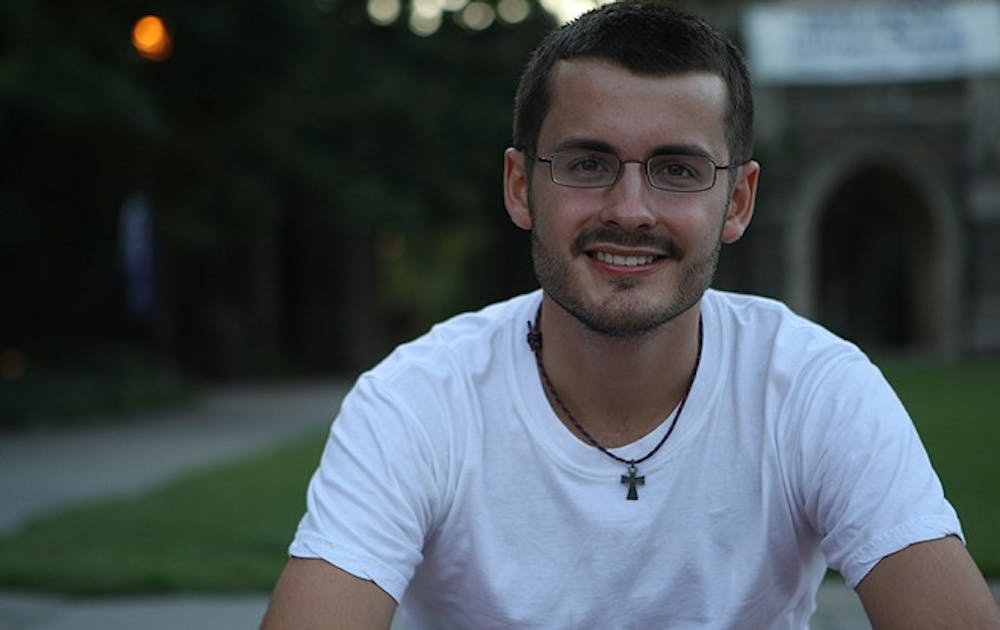Sometimes Dukies are driven by what they’re told to do: study French flashcards, practice clarinet, get good grades, become a doctor. Sometimes, though, we’re driven by what people tell us we cannot do.
While I took a gap year between high school and Duke, I worked for four months at a restaurant in my hometown. I loved the job. Few undertakings require as much teamwork as dinner service at a nice restaurant. Preparing for the Friday night rush is like getting the operating room ready for surgery, except the knives are bigger, and they’re meant for steak rather than skin. You won’t see any written checklists, but everyone’s got one going in their head: stack the glasses, clean the placemats, stock the bar, warm the bread, shine the silverware. When customers start to fill the tables, the operation begins—and everything must happen at precisely the right place and exactly the right time.
The restaurant staff had the kind of diversity that would set any Duke admissions officer salivating. There was someone of every race and ethnicity you could imagine. But it wasn’t an egalitarian sort of diversity; there was a hierarchy, a binary division between those who were accepted and those who were merely tolerated. The owner, an immensely talented and occasionally terrifying chef, who had the gout to prove his love for rich food, was white. The general manager, the one in charge of everything besides the food, was black. The chef de cuisine, who runs the kitchen and tells you where to take plates and berates you when you forget a seat number, was Asian.
Then there were the busboys and the dishwashers. All of the lowest-paid workers, those busboys who clear plates and the dishwashers who scrub for hours, were Latino immigrants. This is typical of most restaurants in D.C., from McDonald’s to Zagat-rated bistros. The restaurant I worked at was no exception; all of the busboys were Latino, almost exclusively from Honduras. Some of the guys were totally bilingual, while others were still trying to get past “hello” because they just arrived last month.
I was applying to restaurants in the area for a job waiting tables in the summer of 2010, when the aftershocks of the recession were hitting restaurants hard. After job application number 20, I decided I would take any job I could get and started checking the “busboy” box on applications. When I met with the general manager of the restaurant that hired me, I must have startled him. A white boy applying to work as a busboy—let alone one who was headed to college—was beyond unusual. In fact, I was probably the first non-Latino busboy the place had ever employed. And I was happy with that.
You know how some people are Francophiles? They love French food, French wine, the French language, French people. You could say I’m a Latinophile. I love the food, the aguardientes (national liquors), the español, the people. Yes, I think Shakira’s great, but I love more Latin music than Shakira: Luis Enrique, Julieta Venegas and Manu Chao. I love getting to know Latino families, hearing about where people are from and exploring the differences and similarities in our cultures.
Because of this, I also loved working with the Honduran guys on the wait staff. We talked in Spanish (except when they asked for mini-lessons in English). We talked about their lives back home, their lives here and our goals for the future. We shared jokes, stressful nights in the weeds and a rollicking New Year’s Eve. The two brothers I worked with even invited me to their cousin’s baby shower. In Honduras, baby showers aren’t just for the women; they’re more like a giant family party with eye-popping piles of tamales, fried plantains and Coronas. Coming into their house felt like crossing the border into Honduras, and I ate it up (literally and figuratively).
I was that one gringo busboy, and I was happy that way. But not everyone was. One night during the staff meal called family dinner, one of the cooks, an angry white guy, called me out and asked why I spent all my time with the “brown boys.” There was an unspoken but obvious underlying question: “Why don’t you stick with your own kind?” He looked at the Honduran brothers, then back to me. Then, he invented a label to mark me: “What are you,” he said, “Some kind of wannabeaner?”
I brushed off his label in the moment. Restaurant kitchens are not Common Ground retreats; no one wants to hear about the value of diversity or Latino customs or what it feels like to be called a beaner—a derogatory term for Latino immigrants implying that they’re fit for nothing but picking beans. Everyone just laughed because it’s a pretty clever pun on “wanna-be” and “beaner,” but I didn’t forget about the label.
I embraced it. Being called a “wannabeaner” only strengthened my determination to learn about and travel in and love Latin America. I lived in Costa Rica for the last four months of my gap year, and at Duke I’ve done more. I’ve taken classes about Latin American politics and started to learn Portuguese because I want to speak the three major languages of the Americas. This summer I worked exclusively on Latin American issues at a nonprofit in D.C. I even hosted a potential member of the Class of 2016 during Latino Student Recruitment Weekend (and he came to Duke).
Like so many other determined Dukies who have been doubted or reprimanded or judged, I have lived in defiance of someone who told me “no.” Yes, I am a wannabeaner. And yes, you should be what you wanna be, too.
Get The Chronicle straight to your inbox
Signup for our weekly newsletter. Cancel at any time.

